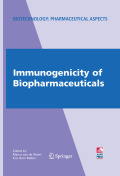
A particular issue for biopharmaceuticals that has not been addressed comprehensively in any book, is the potential of an immune response to the biopharmaceutical product. That is, the human body marks the drug as a foreign body, anddevelops antibodies against the drug. These antibodies may be relatively harmless, but may also cross-react with the endogenous compound, causing autoimmunogenicity. Recent adverse experiences in Europe with Janssen-Ortho’s blockbuster product Eprex has increased the attention towards potential immunogenicity of biopharmaceuticals, above all from the regulatory agencies. This book is intended to give a broad overview of the current state-of-the-art regarding the immune response to biopharmaceuticals. The chapters range from an overview of the immune system and factors that may trigger the immune system, via detection of antibodies and clinical implications, to various case examples and the regulatory view on immunogenicity. First book to address the potential of an immune response to the biopharmaceutical product INDICE: Preface.- Antibody formation to biologicals – a general overview.-Clinical aspects of immunogenicity to biopharmaceuticals.- Assays to determine the immune response to biopharmaceuticals.- Models for prediction of immunogenicity.- Immunogenicity of biopharmaceuticals: causes, methods to reduce immunogenicity, and biosimilars.- Case study: Immunogenicity of rhEPO.- Case study: Immunogenicity of interferon-b.- Case study: Immunogenicity of insulin.- Case study: Immunogenicity of Factor VIII.- Case study: Immunogenicity of Natalizumab.- Case study: Immunogenicity of anti-TNF antibodies.- Case study: Heparin-induced thrombocytopenia.- Presenting an immunogenicity risk assessment to regulatory agencies.
- ISBN: 978-0-387-75840-4
- Editorial: Springer
- Encuadernacion: Cartoné
- Páginas: 250
- Fecha Publicación: 01/03/2008
- Nº Volúmenes: 1
- Idioma: Inglés
